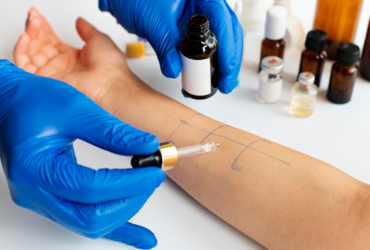Allergen Detection with Integrated Labs
What is a Food Allergy?
A food allergy is a condition that causes the immune system to treat a normally harmless type of food as a dangerous virus, bacteria, or other infectious agents. [link]
Allergens trigger an immune system response (allergic reaction) to a food product that can lead to mild to serious health concerns within minutes to hours after consuming the allergen. Common symptoms of a food allergy include hives, swelling, itching, difficulty breathing, and in severe cases, anaphylaxis. It is important for individuals with food allergies to carefully read food labels.
What is Allergen Detection?
Allergen detection is different than testing for harmful substances that have contaminated the food.
Food allergen testing detects processed and unprocessed food allergen proteins. This means your food products will be thoroughly analyzed for any presence of food allergens, such as Soy or Dairy, so that you can forewarn your customers about it through labeling.
What Allergens do you currently test for?
We test primarily for Dairy and Soy in Food, Beverage, or Supplement products.
Why do I need Allergen Detection Testing?
Food allergen testing plays a crucial role in ensuring the safety of food products for consumers with food allergies. Allergens are one of the single causes of global product recalls, and are essential for anyone creating or manufacturing a food product.
Milk is responsible for more than a third of all food product recalls caused by undeclared allergens in the U.S. in the past decade*. As of January 2019, 1.5 million US adults have a soy allergy and there is a growing concern among Americans.
To prevent these allergic reactions, food and supplement products must highlight what potential allergens are in their products or keep their items free of allergens that may cause allergic reactions. [link] Any Absence claims, when used, must be truthful and not misleading, per the Federal Food, Drug, and Cosmetic Act.
How do I benefit from Soy or Dairy Detection Testing?
Once your product is tested and verified as Soy and/or Dairy free you can label your product “Dairy Free” or “Soy Free”. This not only protects your consumers and your brand, it also can draw in segments of consumers who look for this labeling for health or environmental reasons.
In example, a Coffee Product that wants to label “Dairy Free” can contact us, submit a sample, and if not present, receive documentation to safely label their product as such.
Allergen Testing and Analysis include
Identification of dairy and/or soy in your product
Risk Assessment to reduce allergens
Minimized risk factors caused by allergens
What Will I Need To Do To Test for Soy or Dairy?
Working with Integrated Labs is as easy as 1-2-3!
- Contact us: Fill out the form on this page, or on our contact us page, and tell us about the food/beverage or supplement product you need tested to confirm availability.
- Send us your samples: Once the lab confirms availability, you will ship us the samples that need allergen testing.
- We test your product: The lab will test your product for the allergens and will send you a Certificate of Analysis for the allergen identification testing. Use the Certificate of Analysis for proof of the presence or absence of allergens in your product.





